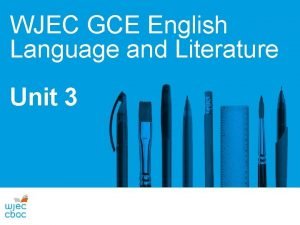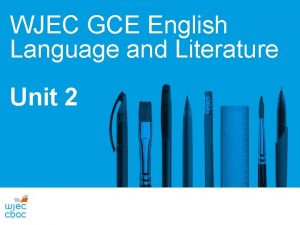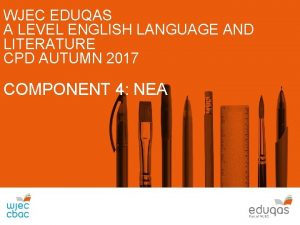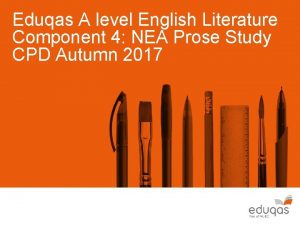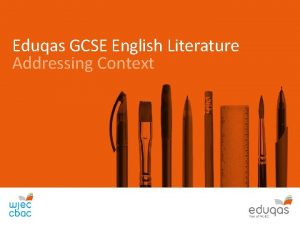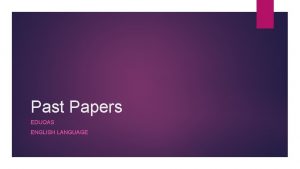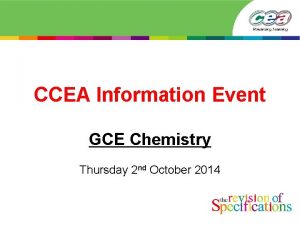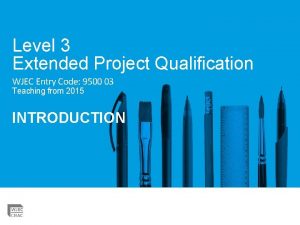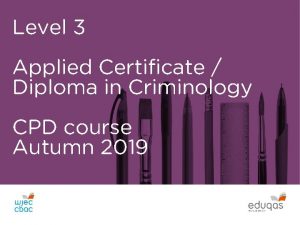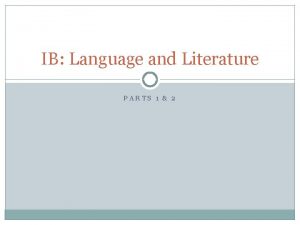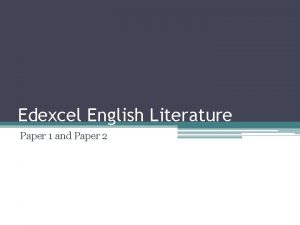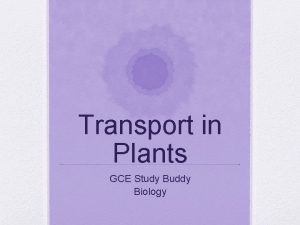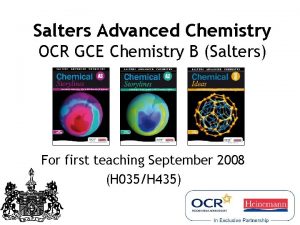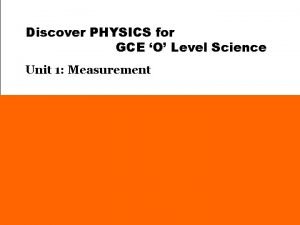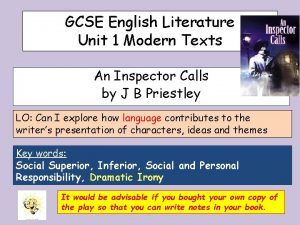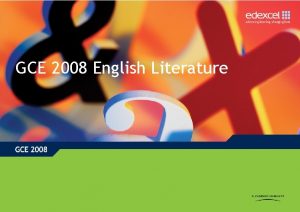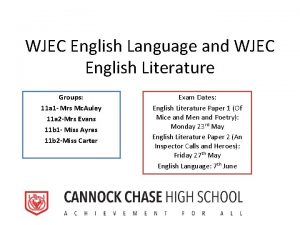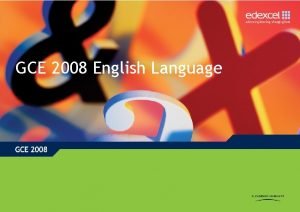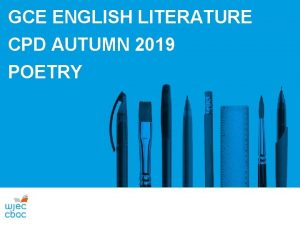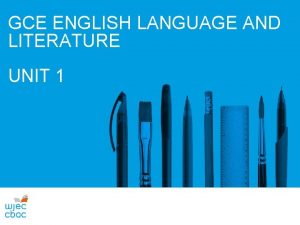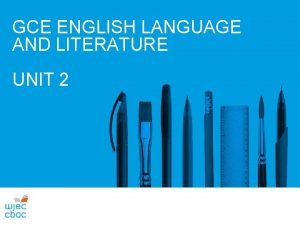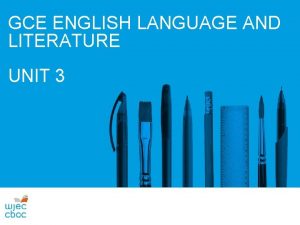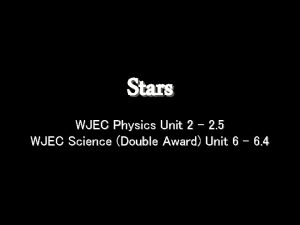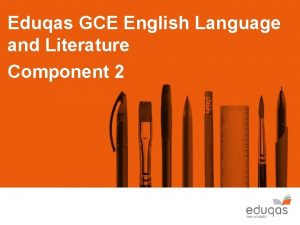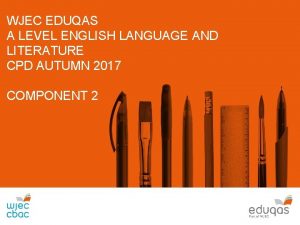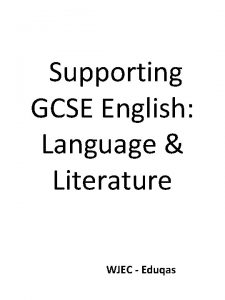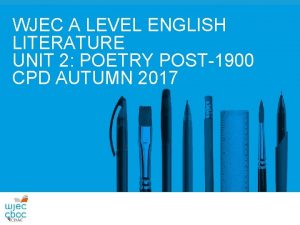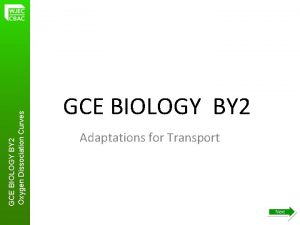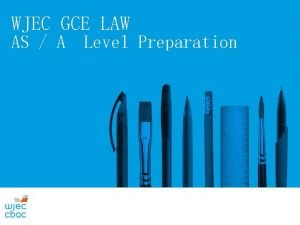WJEC GCE English Language and Literature Unit 3





































- Slides: 37

WJEC GCE English Language and Literature Unit 3

Overview • Written examination (closed book): 2 hours (120 marks) • 20% of qualification • Section A: One extract-based question based on the reading of one Shakespeare play from the prescribed list for this unit • Section B: One essay question based on the reading of one Shakespeare play from the prescribed list for this unit

For this unit, candidates need to • use integrated linguistic and literary approaches • analyse how meanings are shaped in their set text • show knowledge and understanding of relevant language levels • use accurately a range of linguistic and literary terminology • demonstrate an understanding of the significance and influence of the • use contexts in which texts are produced and received • organise responses in a clear and effective academic style and register with • use coherent written expression.

Candidates are required to study one Shakespeare play selected from the list below: • • • Antony and Cleopatra King Lear Much Ado About Nothing Othello The Tempest N. B. For the purpose of the examination, the Collins Alexander Complete Works of William Shakespeare will be used for extract-based questions.

Candidates are required to complete two questions – one from Section A and one from Section B. Mark Allocation • Section A - one compulsory extract-based task (40 marks) • Section B - one extended essay from a choice of two (80 marks). Time management in the exam • Section A – it is advisable to spend 45 minutes on the extract-based question • Section B - it is advisable spend 1 hour 15 minutes on the

The Extract Question King Lear 1. By focusing closely on the literary and linguistic techniques used, explore how Shakespeare presents Lear’s state of mind in this extract from Act 3, Scene 4. [40]

Assessment Objectives AO 1 (25 marks) Apply concepts and methods from integrated linguistic and literary study as appropriate, using associated terminology and coherent written expression AO 2 (15 marks) Analyse ways in which meanings are shaped in texts

The Essay Question The essay will require candidates to demonstrate knowledge of the wider play and to select appropriate supporting evidence in their response. There will be a choice of question on the studied text e. g.

Assessment Objectives AO 1 (35 marks) Apply concepts and methods from integrated linguistic and literary study as appropriate, using associated terminology and coherent written expression AO 2 (15 marks) Analyse ways in which meanings are shaped in texts AO 3 (30 marks) Demonstrate the significance and influence of the contexts in which texts are produced and received

Unit 3 Examiner’s Report – Key Messages What went well… • As a closed text examination, this paper is challenging for candidates and it was encouraging to note that many centres had thoroughly prepared candidates for this examination • Many candidates engaged with the set texts and examiners read many insightful and perceptive responses to the set questions • The best responses evaluated literary and linguistic features (AO 1), confidently linking language and meaning (AO 2) • For Section B candidates also had to provide relevant contextual detail (AO 3) and link it meaningfully to the set text they had studied the best responses saw this context being applied to the Shakespeare text

Unit 3 Examiner’s Report – Key Messages The extract question… • Spend 45 minutes responding to Section A • Candidates need to read, think and write at speed • Candidates are free to select detail from within the extract to focus on but they are expected to provide coverage of the whole extract. (e. g. some candidates only referred to the first half of the extract and completely ignored the ending) • Sustained analysis of the extract, covering a range of points and exploring language/meaning in detail, is needed • Brief responses are self-penalising (e. g. responses that were a side to a side and half rarely scored well)

Unit 3 Examiner’s Report – Key Messages The extract question… • Include a brief introductory sentence placing the extract in the context of the play – 1 -2 sentences are sufficient here • Candidates need to focus on discussing the specified extract rather than other parts of the play • Candidates are expected to respond to the extract with knowledge and insight - the extract should not be treated as an unseen text

Unit 3 Examiner’s Report – Key Messages The extract question… • Candidates need to be specific in identifying terminology - too many candidates quoted whole sentences or phrases, generally labelling them with the ‘verb’/’modal verb’/’noun’ etc. , without identifying which word they were attempting to analyse • Candidates should refer to at least one term per cited example – this term should be specifically supported by the example • Terms need to be purposefully applied – this is not a feature spotting exercise

Unit 3 Examiner’s Report – Key Messages The extract question… • Context (AO 3) is not explicitly assessed in Section A – avoid irrelevant contextual detail • It is possible to credit contextual information if a candidate has used relevant detail to inform their reading (AO 2) of the extract • However, a number of candidates included irrelevant contextual detail at the expense of close focused literary and linguistic analysis (AO 1) when discussing meaning (AO 2) • Candidates need to be reminded of the importance of reading the set question and shaping their response to address the requirements of the question asked

Unit 3 Examiner’s Report – Key Messages The essay question… • Spend 1 hour and 15 minutes responding to Section B • Candidates need to produce one essay from a choice of two on the same text that they use for Section A • Candidates are expected to show wider knowledge of the text as a whole • Candidates may refer to a selection of key episodes in detail as long as they place them within the context of the whole text and they are relevant to the actual response • The selection of examples to support their argument also addresses AO 1, as this Assessment Objective considers their line of argument and the organisation of their response • It is not advisable for candidates to refer only to the first act of the play (e. g. Cordelia)

Unit 3 Examiner’s Report – Key Messages The essay question… • Encourage candidates to plan their response carefully • Responses need to be shaped and coherent arguments clearly constructed • Essays need to be sustained – work that is too brief is selfpenalising • Essays that are overly long (some were in excess of 12 sides) can also be self-penalising as the focus sometimes drifts • Answer the set question – some students had pre-prepared responses they were determined to write down regardless of the question (e. g. an essay on women in King Lear rather than focusing specifically on Cordelia or women in Othello loosely linked to the set question on male power)

Unit 3 Examiner’s Report – Key Messages The essay question… • Given the fact that this is a closed text examination, in order to fully access AO 1 candidates need to have prepared thoroughly and learned a sufficient number of relevant quotations • They need to apply a range of literary and linguistic terms to access the marks available • As with Section A, candidates need to be far more specific in identifying language (e. g. The use of the conjunction ‘By land sea’…. ’) • Candidates need to be reminded of the importance of quoting accurately from the play – there were several instances of made up quotations • Avoid description/narration – candidates should be encouraged to adopt the SEA approach

Unit 3 Examiner’s Report – Key Messages The essay question… • Context (AO 3) is clearly important in Section B - relevant context should be used to illuminate the candidate’s argument • Avoid generalised context which has little relevance to the set task (e. g. context being addressed through irrelevant biographical information relating to the author) • Avoid the ‘history’ essay – some candidates provided limited discussion of the actual play itself • Responses should always lead with the play itself and embed relevant contextual detail • Candidates need to put the text at the centre of their response and apply relevant context (rather than vice-versa)

Unit 3 Examiner’s Report – Key Messages The essay question… • The best responses applied context to their reading of the text and provided thoughtful interpretations of the play • Candidates who wrote mini-biographies, random historical detail or who included context as a ‘bolt-on’ at the end of a paragraph performed less successfully than those who meaningfully embedded contextual detail into their responses

Unit 3 Examiner’s Report – Key Messages The essay question… • Prepare candidates with a wide and broad understanding of the social, political, historical and cultural context of their chosen text and how to apply that context to the Shakespeare text • Encourage candidates to consider how their chosen texts can be interpreted in contemporary and modern societies

Unit 3 Examiner’s Report – Key Messages • In terms of organisation, students need to be reminded of the importance of paragraphing and coherent written expression • The correct spelling of Shakespeare and character names must also be stressed

Unit 3 - Focus Areas 1. Exploding the question 2. Context

Exploding The Question • For both Section A and Section B of the Shakespeare paper, candidates need to be reminded of the importance of reading the set question and shaping their response to address the requirements of the question asked

Exploding The Extract Question Example 1 Much Ado About Nothing 3. By focusing closely on the linguistic and literary techniques used, explore how Shakespeare conveys Leonato’s thoughts and feelings in this extract from Act 5, Scene 1. [40] • Several candidates ignored this question and focused on the presentation of a Leonato

Exploding The Extract Question Example 2 Othello 4. By focusing closely on the linguistic and literary techniques used, explore Shakespeare’s presentation of Iago and his attitudes towards Desdemona in this extract from Act 2, Scene 1. [40] • Some candidates ignored the second part of this question entirely

Exploding The Extract Question Example 3 The Tempest 5. By focusing closely on the linguistic and literary techniques used, explore how Shakespeare creates dramatic tension in this extract from Act 2, Scene 1. [40] • Several candidates ignored this question and focused on the presentation the characters, making no attempt to link back to the question

How does the playwright create dramatic tension/comedy/ mood and atmosphere? Some approaches candidates could use… • What is actually happening on stage – the action itself • Staging/Props • Setting • Characterisation • Character interaction • Conflict – external or internal • Turn-taking • Use of dialogue • Dramatic irony • Language In order to answer a dramatic tension/comedy/mood and atmosphere question, candidates need a clear overview of what is going on in the extract. Candidates need to use clear topic sentences. E. g. Shakespeare creates dramatic tension through the way Ariel manipulates the action… Weaker responses in the examination tended to lead on language techniques. E. g. Shakespeare creates dramatic tension through the use of the superlative.

Exploding The Essay Question Example 1 Antony and Cleopatra 7. “O hard, when love and duty clash. ” Explore the presentation of different attitudes towards duty in Antony and Cleopatra. [80] • Some candidates wrote about love - they read the opening quotation and not the whole question

Exploding The Essay Question Example 2 King Lear 8. “A compassionate but flawed heroine. ” Discuss Shakespeare’s presentation of Cordelia in the light of this statement. [80] • Several candidates ignored the quotation and wrote general character essays • Some candidates based their entire essay on Act 1 Scene 1

Exploding The Essay Question Example 3 Othello 12. Examine the different ways in which Shakespeare presents male power in Othello. [80] • Using women under the umbrella of this task is a valid approach if the question is addressed • Several candidates had, however, prepared an essay on women and ignored the set question • Those candidates who used time in the examination to plan the essay prior to writing it and thought sensibly about how they could utilise women in a male power response tended to provide more relevant responses

Context Candidates need to put the text at the centre of their response and apply relevant context (rather than vice-versa). Context must be meaningfully applied. Some approaches that candidates could adopt include: • • • Social, political, historical and cultural context Biographical – use with caution Audience reaction - contemporary and modern Genre Critical viewpoints Productions

Activity Applying context to the examination question: In groups, consider one of the questions from last year’s examination. • Select key events from the play that could be used to address the question. • Create a list of relevant contextual points that can be applied to each section of the play you have selected.

1. ‘Human suffering has entirely human origins. ’ Examine the different ways in which suffering is presented in King Lear. Section of the play 1. Lear’s decision to divide his Kingdom in Act 1 Scene 1 Relevant contextual detail Abuse of patriarchal power Subversion of the Great Chain of Being Divine Right of Kings Reaction of Jacobean audience James 1 2. 3. 4. 5. Deaths of Lear and Cordelia Concept of the tragic hero Wheel of Fortune Divine Justice

Activity Assessing context within the essay response: Look at the following paragraphs taken from essays produced by students in the Summer 2017 session in response to the question: ‘Human suffering has entirely human origins. ’ Examine the different ways in which suffering is presented in King Lear. Consider how relevant the context supplied actually is. Assess the paragraphs for AO 1, AO 2 and AO 3.

Example 1 Poverty was a prominent issue in the Elizabethan era, as the population grew from 3 to 4 million during Elizabeth 1’s reign alone. As the death rate increased and fertility increased, there became more and more people to feed and more heads to house. The devastating effects of the poor harvests, resulting in starvation led Queen Elizabeth to introduce the ‘Poor Acts’ passing the poor over to society; each person had to pay tax in order to help the poor. This differs hugely from King Lear as he never does anything to help the poor when he is in power. He realises later after meeting ‘Poor Tom’, ‘The thing itself’ that he has ‘ta’en too little care of this’. Shakespeare issued a stark warning to James 1 during the performance of King Lear through the quote ‘Thou wert better off in a grave than endure the extremities of the skies. ’ The noun ‘grave’ really emphasizes how stark this warning was to James 1 was greedy and spent a lot of money on himself. Poverty was still an issue in James’s reign, even after Elizabeth passed the ‘poor acts’ and something had to be done. • • Context is generalised rather than specific Limited range of terms in the paragraph Limited use of reference to the actual text itself Limited focus on the question itself – points not being shaped into an argument

Example 2 At the beginning of the play we are shown how Cordelia’s emotional suffering causes the severance of her filial bond with Lear as she refuses to flatter his ego at court illustrated through her blunt declarative utterance ‘I cannot heave my heart into my mouth. ’ Cordelia’s use of the contrasting nouns ‘heart’ and ‘mouth’ indicate her feelings that true filial love can only be shown through emotional actions and not by empty flattery. Her words suggest that her emotions towards her father are completely separate from her ability to vocalise them in a public arena and this is emphasized through the dynamic verb ‘heave’. The verb suggests the great burden of love for her father is too large or too precious to use to simply consolidate her hold on her part of the inheritance, unlike her sisters Goneril and Regan who were all too happy to conform to societal and parental expectation. Cordelia’s refusal to give into the whims of the patriarch of court would have shocked Jacobean audiences who would have expected her complete obedience to the monarch. Shakespeare, however, portrays Cordelia as a rebellious heroine who denies seventeenth century conformity. She purposefully removes her only power at court – the language of flattery as she recognises that it does not offer female empowerment but empty filial gain. Cordelia becomes an example of the prototypical Shakespearean heroine, and through her chosen silence feminist critics argue she is defying male authority. However, it can be argued that by offending Lear through this self-imposed silence, Cordelia initiates her own suffering which subsequently results in her tragic death. • • Response leads with the text and focuses on the question Relevant use of supporting quotations and terminology Mature reading of text Context is used to illuminate the argument

Cwestiynau? | Any Questions? Cysylltwch â’n Swyddogion Pwnc arbenigol a thîm cefnogaeth weinyddol eich pwnc os oes gennych unrhyw gwestiynau. gceenglish@wjec. co. uk @wjec_cbac @cbac_wjec cbac. co. uk wjec. co. uk Contact our specialist Subject Officers and administrative support team for your subject with any queries.
 Wjec english language and literature
Wjec english language and literature English literature wjec
English literature wjec Eduqas english literature a level
Eduqas english literature a level Eduqas english literature a level
Eduqas english literature a level Wjec eduqas english literature a level
Wjec eduqas english literature a level English literature a level wjec
English literature a level wjec A level english literature nea example
A level english literature nea example Eduqas english literature specification
Eduqas english literature specification Eduqas english language gcse past papers
Eduqas english language gcse past papers Ccea gce chemistry clarification of terms
Ccea gce chemistry clarification of terms Wjec hospitality and catering unit 2 examples
Wjec hospitality and catering unit 2 examples Wjec hospitality and catering unit 2 examples
Wjec hospitality and catering unit 2 examples Wjec epq
Wjec epq Ccea gce health and social care
Ccea gce health and social care Wjec criminology unit 4 past papers
Wjec criminology unit 4 past papers Unit 4 criminology revision
Unit 4 criminology revision Wjec criminology unit 4
Wjec criminology unit 4 Wjec chemistry unit 2
Wjec chemistry unit 2 Wjec chemistry unit 2
Wjec chemistry unit 2 Wjec criminology unit 4 exam 2020
Wjec criminology unit 4 exam 2020 Ac3.1 examine information for validity
Ac3.1 examine information for validity Wjec criminology unit 4
Wjec criminology unit 4 Is english language and literature two separate gcses
Is english language and literature two separate gcses Ib english language and literature part 3
Ib english language and literature part 3 English lit paper 2 edexcel
English lit paper 2 edexcel Who is father of english tragedy
Who is father of english tragedy Gce study buddy
Gce study buddy Ccea gce chemistry practical support
Ccea gce chemistry practical support Gce professional business services
Gce professional business services Gce professional business services
Gce professional business services Ccea gce chemistry practical support
Ccea gce chemistry practical support Ccea gce business studies
Ccea gce business studies Cummins gce
Cummins gce Zero error in screw gauge
Zero error in screw gauge Ccea gce physics past papers
Ccea gce physics past papers Tokyo gce
Tokyo gce Gce bayreuth
Gce bayreuth English literature unit 1
English literature unit 1
